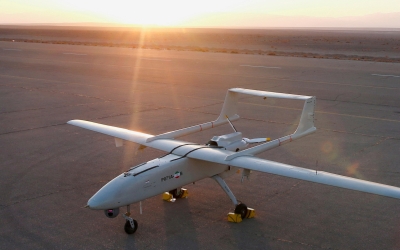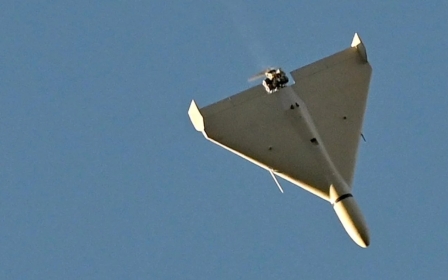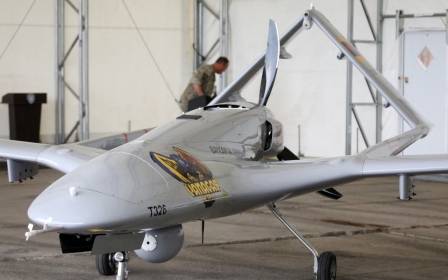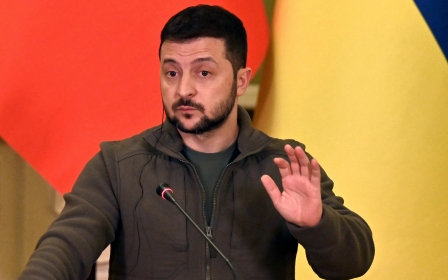Ukraine war: Iran's sale of drones to Moscow will only increase its isolation
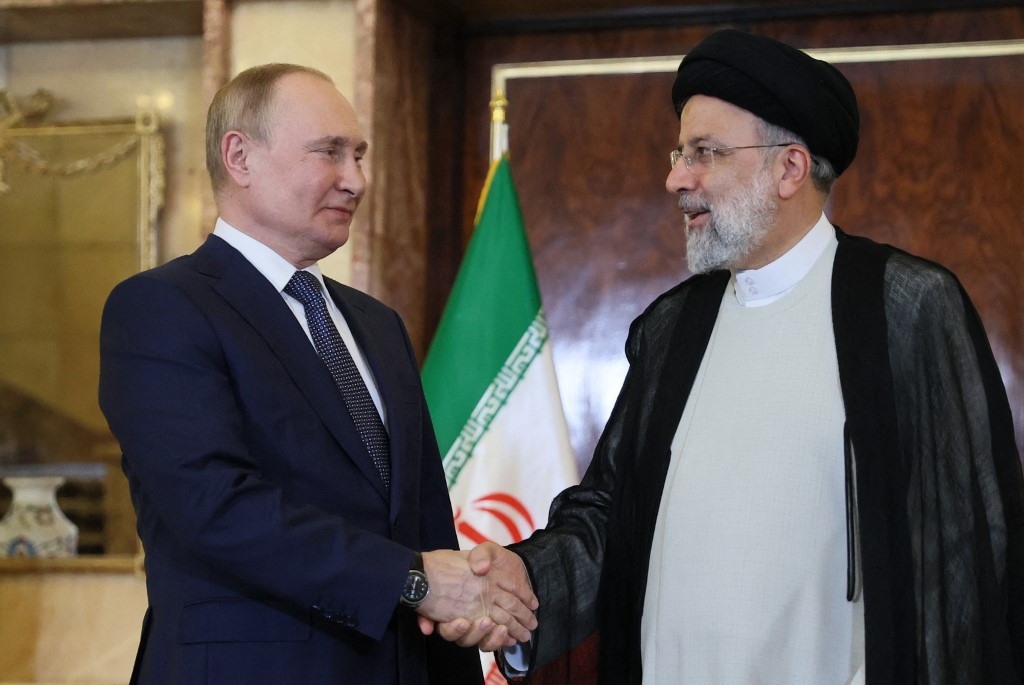
Cooperation between Iran and Russia, which expanded with Russia's intervention in the Syrian conflict, reached a new level with the outbreak of the Russia-Ukraine war.
New areas of cooperation emerged when both countries were excluded from the international system, reaching a peak with the sale of Iranian drones to Russia. These sales appear to have the potential to transform bilateral relations between Iran and Russia and possibly determine the very outcome of the Russia-Ukraine war itself.
Before Russia invaded Ukraine in February, relations between Russia and Iran had focused on the Syrian war, nuclear technology and arms sales.
Moscow allied with Tehran to prevent the overthrow of the Assad government. It also provided technical and diplomatic support to Iran's nuclear activities and generally acted on its behalf at the UN Security Council. Russia also sold weapons to Iran, including the S-300 air defence system. The asymmetry in this relationship had always been in Russia's favour.
However, the Ukraine war has brought a new dimension to relations. Although Iran has claimed neutrality since the beginning of the war, it indirectly, but unhesitatingly, expressed its support for Russia - Iran’s Supreme Leader Ali Khamenei, who blames the US and Nato for the war, has always voiced the Moscow line.
However, verbal support alone was not enough. Russia's depleted resources in Ukraine has made it increasingly dependent on Iran's help, including in the energy, investment, aerospace and military sectors.
Eventually, this saw Iran providing drones to Russia. In August, news about Moscow's possible purchase of “hundreds” of Iranian-made drones hit the headlines. In September, the Ukrainian military announced it had shot down an Iranian-made drone. In recent weeks, Ukrainian allegations that Iranian "kamikaze" drones have been used in the field have multiplied as cities have been hit.
Furthermore, according to the White House, Iranian soldiers are being stationed in Crimea in order to train Russian soldiers to use the drones.
Kamikaze drones
According to US officials, drones exported to Russia from Iran include the Mohajer-6 and Shahed series. While no details were provided on which series of Shahed was being sold, it is claimed that Russia has started to use the Shahed-129 and Shahed-191, but also the Shahed-131 and Shahed-136, the latest ones being loitering drones. These allegations have become unabated as cities in Ukraine started to be hit by loitering munitions and several Iranian drones were hit by Ukrainian forces.
These drones have different capabilities, including intelligence, surveillance, target acquisition and reconnaissance operations, and at the same time strikes and electronic warfare missions.
Specifically, the Shahed-129 is the one most similar to the Turkish Bayraktar TB2, as both are medium-altitude, long-endurance UAVs. Indeed, the Shahed-129 is also known for its similarities with the American Predator and Israeli Hermes 450 UAV.
Kamikaze drones, such as the Shahed-131 and Shahed-136, are easier to produce, relatively cheap, and as such are often the weapon of choice for violent non-state actors
Kamikaze drones, such as the Shahed-131 and Shahed-136, are easier to produce, relatively cheap, and as such are often the weapon of choice for violent non-state actors. However, they are slower, have a lower flying ceiling and have a smaller payload capacity. This limits their impact on the battlefield.
However, when used by states, as in the case of the Ukraine-Russia war, the reduced impact of loitering drones on the battlefield can be offset against the psychological damage inflicted on the enemy. This could be the main reason behind Russia's latest attacks on Kyiv.
At a time when Ukrainian morale - both in terms of the country's leadership and among civilians - is high, these attacks aim to damage confidence and impede Ukraine’s advances. Until now, Ukraine’s defence has been quite successful, and it is widely accepted by experts and decision-makers that its use of drones, especially that of the TB2, has played a crucial role.
But the Turkish drones have already proved their effectiveness, while the Iranian drones have not been used extensively by state actors, meaning their capabilities are largely unknown. As a result, it is far from certain that the Iranian drones will give Russia the same edge that the TB2s gave to Ukraine.
Fraught relations
Tehran-Kyiv relations have lately been fraught. In 2020, the downing of a Ukrainian airliner, which left 176 passengers dead, seriously harmed Iran-Ukraine relations. Iranian authorities first tried to cover up the incident, before saying that the Revolutionary Guards had mistakenly shot it down. Ukrainian President Volodymyr Zelensky and other senior officials blamed Iran and relations deteriorated.
Iran's support for Russia was the final straw in the deterioration of Iran-Ukraine relations. Ukrainian Foreign Minister Dmytro Kuleba allegedly advised Zelensky to cut diplomatic relations with Tehran due to its supply of arms to Russia.
At a time when nuclear negotiations between Iran and world powers are stuck, these developments would appear to only increase Iran's global isolation. The US, UK, France and Germany argue that Iran violated UN Security Council resolution 2231 that governs the 2015 nuclear deal with the sale of drones to Russia.
On 20 October, the UK imposed new sanctions on Iranian individuals and businesses supplying Russia with kamikaze drones. Nato's Secretary-General Jens Stoltenberg said there was strong evidence that Iranian drones were being used in Ukraine.
Iran has denied the accusations, with Tehran claiming that it did not supply drones to Russia for the Ukraine war, that the drones were delivered before the conflict started, and that the US itself violated resolution 2231 by unilaterally withdrawing in 2018 from the Iran nuclear deal, formally known as the Joint Comprehensive Plan of Action (JCPOA).
Russian officials say that the drones used in the war are their own, and that Iranian drones are not being used.
Iran protests
The international crackdown on Iran's sale of drones coincided with the country being rocked by protests over Mahsa Amini, the young woman who died while being held in custody by the so-called morality police.
As the demonstrations escalated, western countries began to harden their rhetoric towards Iran. While the US and Britain were imposing sanctions on Iran, the German foreign office announced a downgrading of bilateral relations with Iran.
Tehran may have felt obliged to support Moscow in Ukraine due to its asymmetrical relationship with Russia in many areas, but especially in Syria.
However, the cost of this choice is becoming ever more apparent as Iran becomes increasingly globally isolated. Even though Iran-Russia collaboration precedes the protests, Iran is in a tough situation due to double pressure from abroad. Managing the escalating tensions both inside and outside the country will be a challenging task for the Tehran administration.
The views expressed in this article belong to the author and do not necessarily reflect the editorial policy of Middle East Eye.
Middle East Eye delivers independent and unrivalled coverage and analysis of the Middle East, North Africa and beyond. To learn more about republishing this content and the associated fees, please fill out this form. More about MEE can be found here.


